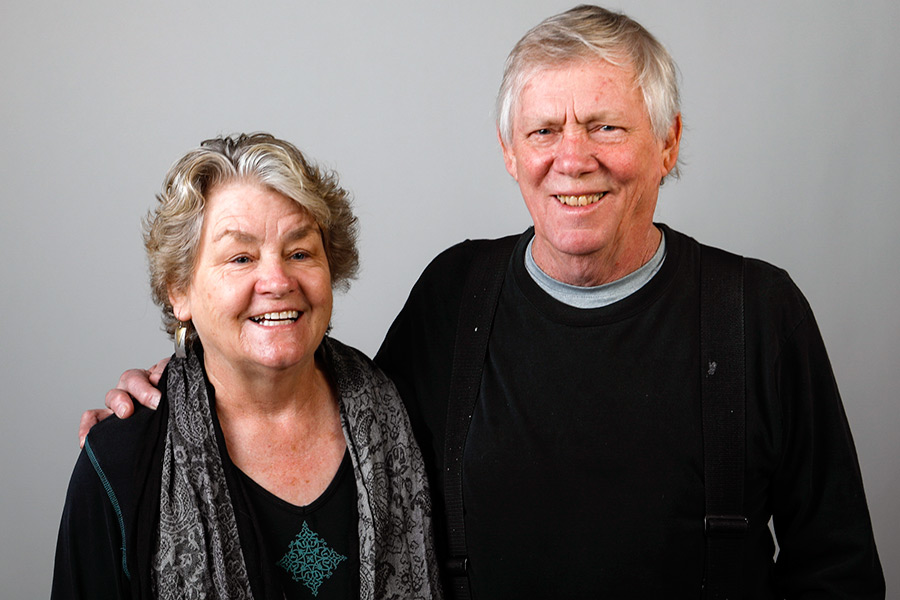At 70, Columbia Falls Man Finds Sister He Never Knew He Had
Fred Turk was adopted as a newborn and didn't know his birth family, but then he loaded his information into Ancestry.com
By Molly Priddy
When Fred Turk was born 70 years ago in California, he didn’t know that his mother would die of polio less than two years later. He didn’t know that his sister would come into the world a year after he did; he didn’t know she even existed.
After his birth, Turk spent the next 13 years assuming his parents were his birth parents – a Hungarian mother and an Austrian father in the San Fernando Valley — until the neighbor kids capitalized on newfound information and told him he was adopted.
He would spend a good chunk of the next five decades wondering, about his birth parents, about where he came from, about what happened all those years ago.
“As I grew up, I was really wondering, ‘Who is my (birth) mom?'” Turk said last week.
He did what he could with what services were available in the 1980s and 1990s, but the Catholic Church had facilitated his adoption and was an effective brick wall when it came to releasing information. The search fell to the backburner, and Turk went on with his life, eventually landing in Columbia Falls years after a brief run-in with Montana during his youth had snared his heart.
And then the Internet happened.
Turk and his wife, Dawn Marie, decided to play around on Ancestry.com, a website that asks for a cheek swab of DNA and then connects that person to other people who share that same makeup. The goal was to be able to tell his children about their heritage, and maybe find out more about his mom, Turk said.
When the technology moved beyond the couple’s experience, they turned the project over to Turk’s son, Zachary, who was about to graduate from Yale University. The site picked up a few distant cousins, but nothing major, Turk said, until a late-night phone call.
“Zachary calls at 11 o’clock at night and says, ‘You’re never going to believe this — I just talked to your sister,’” Turk said.
Turk always felt fortunate to be adopted as a baby. It was the mid-1940s, and there were thousands of single parents in California at that time, he said.
“I always looked at it like I was lucky to get picked,” he said.
His parents were devout Catholics who adopted him through the church, and who initially denied the adoption story from the neighborhood kids when Turk asked them.
When he found out about his origins, Turk was curious and tried to learn more, but information was difficult to find. He went about the business of growing up and becoming his own person, leaving California only after the major earthquake of 1971 destroyed his house.
Turk hopped into a VW bus and traveled around, including a visit to Montana, and eventually settled in northern California, fixing up houses in his lifelong career in remodeling and finishing.
He didn’t know, couldn’t know, that all that time, his half-sister Yvonne Springer was looking for him. They had the same mother, Vera Tucker, who was dating Fred Springer when he left on Army deployment in WWII. When he returned, he found Tucker was five months pregnant from a situation the family believes was not consensual. The couple eloped, but Springer’s parents sent her to a Catholic home for unwed mothers in Los Angeles, where she was forced to put her son up for adoption.
She birthed Yvonne a year later, but fell prey to polio, dying at the age of 20.
“Her last dying words, and she went pretty damn quick, were, ‘Put the children together,'” Turk said.
Springer’s father, who wasn’t the same man as Turk’s birth father, hired attorneys to try finding Turk, but the boy was gone, his files sealed.
“We left within 72 hours of getting that call,” Turk said. “I never in my whole life have had anyone from my birth side.”
He and Dawn Marie drove their Subaru 1,700 miles in four days to get to his sister, speaking with her on the phone multiple times before arriving. When they got to the same Morro Bay hotel parking lot, Springer was in her Prius, Turk remembers, but not for long.
“She got out of the car and ran up and hugged me,” Turk said. “And she looked at me and said, ‘You look just like your grandfather.’ And I do!”
The siblings spent days together, telling stories, learning about how they’d lived near each other during their early lives, and supporting each other.
“Every morning it was hugs and every night it was hugs,” Turk said.
Both of the siblings have had their share of health issues, with Springer surviving cancer and Turk scheduled for stomach surgeries soon. But the fact that both had loaded their information into the Ancestry.com website, and both had lasted long enough in this world to find each other, to fulfill their mother’s wish?
That’s a miracle, Turk said.
“The Lord made us live long enough to find each other,” he said.